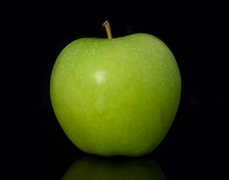 , produced by Canadian company Okanagan Specialty Fruits, have been under review by US regulatory agencies since 2010. If approved, they would become the second GMO fruit to be allowed in the country. The new, genetically modified apples do not bruise or brown.
, produced by Canadian company Okanagan Specialty Fruits, have been under review by US regulatory agencies since 2010. If approved, they would become the second GMO fruit to be allowed in the country. The new, genetically modified apples do not bruise or brown. Americans may soon be biting into the future of apples.
Pending approval by the US Department of Agriculture and the Food and Drug Administration, genetically modified apples could get the green light to appear supermarket shelves.
Dubbed “botox apples” because they are designed to prevent bruising and browning, Arctic Granny Smith and Arctic Golden Delicious apples made by Canada’s Okanagan Specialty Fruits have been under review by US regulatory agencies since 2010 and could become the second genetically modified fruit to be allowed in the country.
“Not only do they have significant potential to reduce food waste, the resistance to browning results in better taste, texture and likely a retention of healthful components like vitamin C and antioxidants, which are typically burned up in the browning reaction,” Joel Brooks, marketing specialist at Okanagan, told the Washington Times.
Apple growers in Washington state oppose Okanagan’s bid to bring its scientifically enhanced fruit to market. The Northwest Horticultural Council fears that genetic drift from GMO crops will contaminate fields of organic apples, and result in loss of European sales, where the crops have not been approved.
Neal Carter, president of Okanagan Specialty Fruit, says he expects the USDA and the FDA to give their approval to have the company's apples deregulated by the end of the year.
Neal Carter, president of Okanagan Specialty Fruit, says he expects the USDA and the FDA to give their approval to have the company's apples deregulated by the end of the year.
Like Monsanto, the world’s leading producer of GMO seed stock, Okanagan has come out against the kind of mandatory labeling standards that are in place in the European Union and much of the developed world, but the company says it will voluntarily identify its apples with a sticker that reads "Arctic."
“We as a company don’t support mandatory labeling because we feel it basically undermines the regulatory process,” Neal Carter, president and founder of Okanagan, told Chemical & Engineering News. “We’ve gone through a three-year, very rigorous process and the result of that is that it’s deemed to be as safe as any other apple. Finally they expect you to put a label on it like a scare tactic against GMOs.”
Naturally occurring enzymes cause browning and bruising in apples, but Okanagan scientists were able to suppress their production and therefore prevent discoloration.
Carter is optimistic that his company will get the green light from US regulators and that the genetically enhanced apples will soon join the Hawaiian papaya as the only two genetically modified fruits to be available in produce aisles.
“We expect a second US public comment period, which will be 30 days long, to open within the next few months and anticipate full US deregulation later in 2013,” explained Carter.







